A decade of small boat migrants - how did it begin?
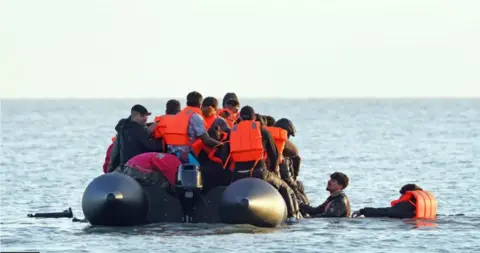 PA Media
PA MediaIt has been a decade since the BBC first reported on a small, sporadic number of boats with migrants on board arriving off the Kent coast from France.
At the time, the focus was mainly on the thousands of attempts by migrants in northern France, who were attempting to stowaway on lorries and ferries to the UK.
In the nearby "Calais Jungle" thousands of men, women and children were living under canvass in a sprawling camp that was later cleared by the French authorities.
But as security was tightened around the ports and Eurotunnel, within three years, significant numbers were using small boats instead to make the dangerous crossing.
With the Prime Minister claiming the UK will begin returning some migrants arriving in small boats to France under a new pilot scheme, BBC South East looks back on the emergence of smugglers using maritime routes into Britain 10 years ago.
A former head of Border Force, an ex Dover coastguard and a retired customs chief investigator recall how they were first made aware of small boat crossings - and offer suggestions on how they could be stopped.
The ex-Border Force chief
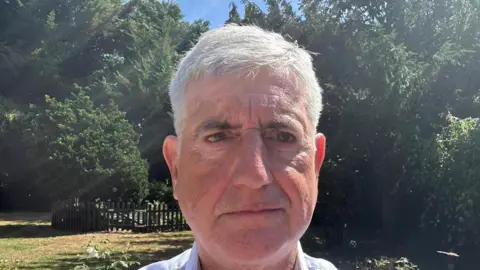 Tony Smith
Tony SmithTony Smith is the former director general of Border Force. He served for 40 years, retiring in 2013.
He said he was never aware of any arrivals by boat during his time in the service and says at that time he was advised that it wasn't a threat.
"The problem was people penetrating via ferries and lorries and I think the reason people shifted to the boats was because we'd done quite well in stopping them coming in by other routes," he said.
"I was advised during my time as gold commander for the London 2012 Olympics and as head of Border Force that this was not a threat.
"The currents were too difficult, these were busy shipping lanes, nobody would be able to make it across, so I was very surprised when I saw that boats started arriving, particularly small boats and dinghies.
"As soon as the migrants and smugglers realised this was a viable route, they were getting ashore, they weren't being sent back and more started to come."
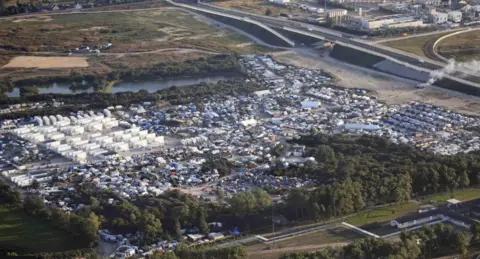 Reuters
ReutersBBC South East first reported on a handful of boat arrivals in 2014 and 2015, with around 100 people arriving in 2016 - but at that stage the incidents weren't published by the Home Office.
The numbers started to climb in 2018, when people from Iran started to make the crossing.
By December that year, the then Home Secretary Sajid Javid declared a "major incident" after an increase in arrivals.
Mr Smith added: "Apart from a reduction in 2023, when we had the Albanian campaign and were able to send people back there, we haven't really been able to return anybody from France to the UK.
On the new agreement with France, Mr Smith said "It probably is ground breaking if we are actually going to put asylum seekers in France back on flights to France."
"I'm hopeful the French tactics in the water might have some impact."
"We still need other options, we could clampdown a lot on illegal working, which I think this government to be fair says it's going to do, but I would be looking at a Rwanda type deal, or some other deal with other countries, so we don't have to rely on 6% returns to France."
The former coastguard
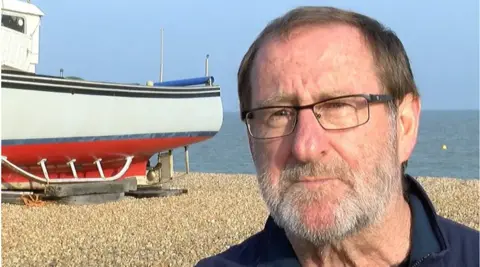
Former coastguard Andy Roberts remembers in 2015 first hearing news about a small inflatable boat arriving with a few people on board - without life jackets - at Kingsdown beach, near Dover.
He said: "There was, understandably, some confusion as to what was the reason for the landing, even comments about the fact they must have got lost when going on a jaunt off the French coast."
Mr Roberts says he never thought it would have become a regular smuggling route.
"The Dover strait is the busiest thoroughfare for shipping in the world, with in excess of 500 commercial shipping movements a day," he said.
"I know there has been in excess of 100 drownings in the past 10 years by people attempting this crossing. I cannot believe that there has been only one incident with in excess of 20 people drowning.
"These small rubber inflatable dinghy's are rarely picked up on ship's radars and in the first few years of these crossings there was no aerial surveillance."
The ex-customs investigator
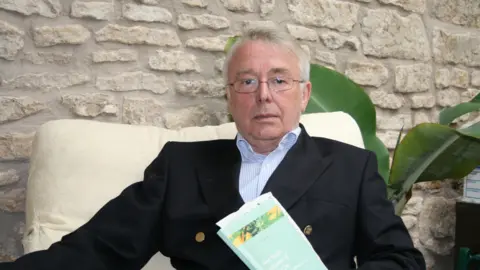 David Raynes
David RaynesDavid Raynes, a former assistant chief investigator for HM Customs and Excise, warned several years ago that the small number of migrants could start to grow if the smugglers saw this as a viable route.
"As I recall, the first boats in 2014/15 were making it across and hitting the beaches," he said.
"There was a gradual transition from hiding in lorries, as that was made more difficult."
Speaking in 2016, Mr Raynes warned smuggling gangs could eventually use so-called "mother ships" further out to sea, to offload migrants on to small boats in the Channel.
Nine years on, he told BBC South East how frustrated he is by successive governments vowing to "stop the boats" or "smash the gangs".
"If the French managed to slash every dinghy, the traffic would not stop," he said.
"It would move, some back to containers and lorries, some to larger boats, more remote coast line. Even to much larger boats, as occurred with drugs.
"What is attractive to migrants is the near certainty they can make it to the UK. The near certainty that they will get to stay.
"That certainty needs to be removed. Quick fixes on party lines go nowhere near the problem."
Follow BBC Kent on Facebook, on X, and on Instagram. Send your story ideas to [email protected] or WhatsApp us on 08081 002250.
